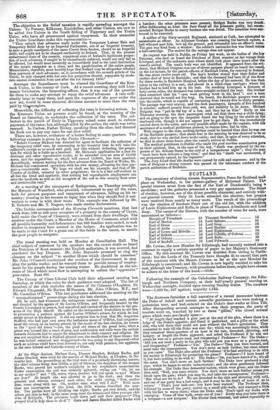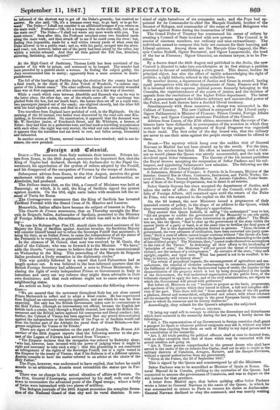SCOTLAND.
The ceremony of electing sixteen Representative Peers for Scotland took place on Wednesday, in the picture-gallery of Holyrood Palace. The special interest arose from the fact of the Earl of Dundonald's being a candidate; and the galleries presented a very gay appearance. The forms of election, however, are of the driest possible character, and entirely with- out general interest. Only 31 Lords attended the election; but proxies were received from nearly as many more. The result of the proceedings was the election of fourteen Peers out of the old list, with the addition of Lords Elphinstone and Rollo, in place of Viscount Arbuthnott and Lord Reay. The names of the Sixteen, with the number of votes for each, were announced as follows—
Marquis of Tweeddale 53 Viscount Strathallan ..... .... 54 Earl of Morton 54 Lord Saltotur 55 Earl of Home 54 Lord Gray 54 Earl of Airlie 51 Lord Sinclair 50 Earl of Leven and Melville ... 56 Lord Elphinstone 54 • Earl of Selkirk 53 Lord Colville, of Culross 53 Earl of Orkney 50 Lord Rollo 49 Earl of &afield 53 Lord Polwarth 58
Mr. Cowan, the new Member for Edinburgh, had recently entered into a contract to supply a certain quantity of paper to her Majesty's Stationery Office. By this contract Mr. Cowan was disabled from sitting in Parlia- ment; but the Lords of the Treasury have thought fit to cancel that part of the contract with the Messrs. Cowans as far as the new Member for Edinburgh is concerned; and Mr. Cowan is now legally entitled to take his seat, although the Treasury, with precedents before them, might have chosen to adhere to the letter of the bond.—Globe.
Following the example of the Caledonian Railway Company, the Edin- burgh and Northern Company, at their half-yearly general meeting on Wednesday sennight, decided upon running Sunday trains. The numbers were-1,389 for, 227 against; majority 1,162.
The Scotsman furnishes a full narrative of a recent encounter between the Duke of Atholl and certain scientific gentlemen who were making a pedestrian tour, and had entered on the Duke's deer-walks at Glen Tilt. After disregarding several attempts to stop their progress, the party of tourists went on, watched by two or three "gillies," who closed several gates which were previously open- " At length they reached a gate just at the end of the glen, where there is a lodge of the Duke's opposite; and found it padloeked, and a gillie on the other side, who told them they could not pass without the Duke's permission. They consented to wait till the Duke was sent for; which was accordingly done, while they remained three-quarters of an hour in the rain, drenched, shivering, and hungry: at length the Duke appeared, and asked the Professor if he was not aware he was on a private road, and trespassing? Professor= No.' The Duke— Did you not meet a party in the glen who told you you were on a private road, and trespassing?' Professor= Yes.' The Duke= Then you were warned, and must tyke the consequences. You don't move an inch further, but must return as you came.' The Duke also asked the Professor if he had anything to do with the society in Edinburgh for protecting the glens?' Professor—'I have heard of it, but have nothing to do with it.' The Duke= Oh, you have heard of it; it's all the same. You don't move an inch further.' The Duke here produced a clay pipe, which he began to smoke industriously; and the other gentlemen followed his example. The Duke then demanded names; which were given; and the Duke then said, Well, you must return. You don't move an inch further unless yen break open the gate; which you may do, and take the consequences.' Professor- ' But What are we to do? We are drenched to the skin and shivering with cold, and one of our party has a bad cough, and it may be the death of some of us to return.' 'That's your look-out; you have been warned.' The Professor then, followed by some of the party, moved op a small side-walk, and stamped a little with his feet to warm them; when the Duke said, Don't spoil my walks with stamping. Come off that walk, every one of you I Every step you take there is a trespass—a new trespass.' The Doctor then returned, and asked repeatedly to be informed of the shortest way to get off the Duke's grounds; but received no answer. He also said, Oh, its a trespass every way, to go back or to go for- ward.' The Duke--' I shall not consider it an additional trespass if you return on the main walk.' Professor—' Oh, it's a trespass then on the side-walk, but not on the main one?' The Duke—' I shall not waste any more words with you. You must return.' Soon after this, the Professor returned some two hundred yards along the main walk, and then struck off to see if he could cross the river; but, finding that impossible, made for a wall within twenty yards of what even the Duke allowed to be a public road ; and so, with his party, escaped into the afore- said road; not, however, before one of the party had been seized by the collar, but within a minute released. And they all then gained the Tilt Inn, drenched, shivering, famishing, and disgusted."
At the High Court of Justiciary, Thomas Leith has been convicted of the murder of his wife by poison, and sentenced to be hanged. The murder had been preceded by a quarrel shoat a woman. In finding the culprit guilty, the Jury recommended hint to mercy; apparently from a mere aversion to death- punishment
The fall of the hustings at Peebles during the election for the county has had a fatal result, in the death of Mr. John Veitch of Woodside, "a zealous sup- porter of the Liberal cause." The other sufferers, though more severely wounded than was at first supposed, are either convalescent or in a fair way of recovery.
While a coach which runs between Aberfeldy and Rannoch was on its way to the latter place, the other day, one of the wheels came off: the coachman was pitched from the box, but not much hurt; the horses then set off at a rapid rate; two passengers jumped out of the coach; one alighted cleverly, but the other fell with his head against a stone, and died in a few hours.
Two travellers from England have perished of cold, in the Highlands. On the morning of the 2d instant, two bodies were discovered by the road-side near Kin- lochbeg, in Inverness-shire. On examination, it appeared that the deceased were Mr. W. Stericker junior, of Fencharch Street, and Mr. Whitbuni, a brewer, of Esher; they had been on a pedestrian tour, and had made a travelling acquaintance with each other: the night was very stormy, the wind and rain exceedingly heavy; it appears that the travellers had sat down to rest, and fallen asleep, benumbed and exhausted.
In another storm at Thurso, several vessels have been wrecked; and in one in- stance, the crew perished.



























 Previous page
Previous page